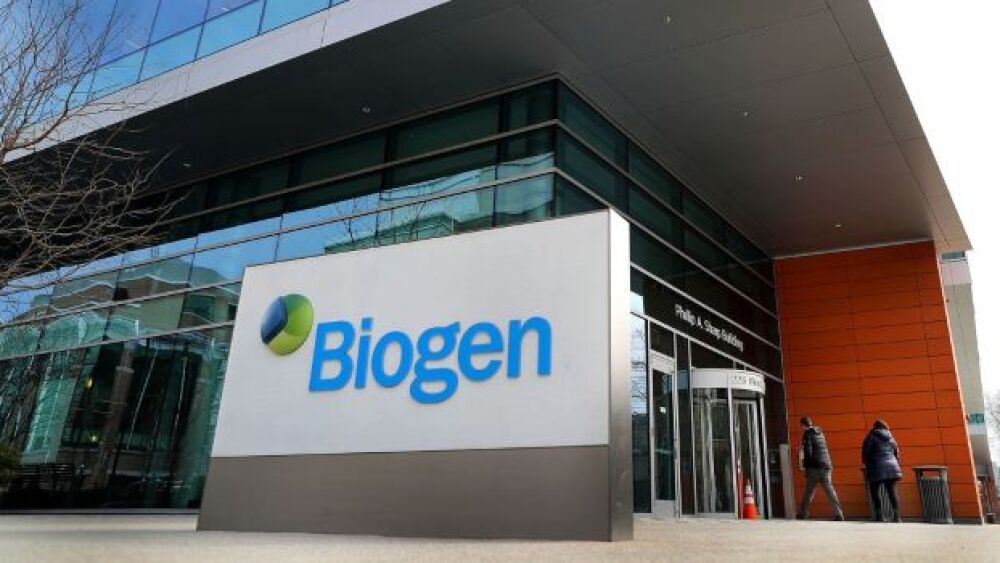In the latest results shared by the company, treatment with nusinersen for a median of 4.9 years helped participants maintain and make progressive gains in motor function.
John Tlumacki/The Boston Globe via Getty
Biogen announced new data and updates from its spinal muscular atrophy (SMA) research program using its therapeutic nusinersen (Spinraza).
Spinal muscular atrophy is a rare genetic neuromuscular disease that causes the loss of motor neurons in the spinal cord, which are essential for muscle strength and movement, through a mutation in the survival motor neuron 1 (SMN1) gene. The loss of motor neurons leads to progressive muscle weakness and a decrease in muscles’ mass and strength, producing deficits in mobility and sometimes dysfunction in breathing and swallowing.
Biogen has been targeting SMA through Spinraza, which works by coupling with the survival motor neuron 2 (SMN2) gene that is unaffected in patients with SMA to increase the body’s access to survival motor neuron protein, leading to the survival of motor neurons. Biogen is currently testing nusinersen in various clinical trials, including ASCEND, NURTURE and DEVOTE. Spinraza became the first-ever U.S. Food and Drug Administration-approved treatment for SMA in 2016.
In an ASCEND study update, Biogen stated that the Phase IIIb trial is currently enrolling, and the first patient has been treated during the first quarter of 2022. Biogen is set to present results from the study at the 2022 Muscular Dystrophy Association Clinical & Scientific Conference. The ASCEND study’s main goal is to investigate the potential benefit of treating non-ambulatory patients with later-onset SMA who have been previously treated with risdiplam (Ervysdi), a therapeutic designed to increase and maintain levels of survival motor neuron protein. The trial’s primary endpoint is a total change from baseline in the Revised Upper Limb Module, an assessment for motor performance in the upper limbs.
Biogen’s NURTURE trial is targeted towards infants in the presymptomatic stage of SMA. In the latest results shared by the company, treatment with nusinersen for a median of 4.9 years helped participants maintain and make progressive gains in motor function, demonstrating that early and sustained intervention is essential in the treatment of SMA.
After 11 months of additional follow-up since the 2020 analysis, all children treated with the therapeutic who were able to walk alone maintained the ability and one child gained the ability to walk alone. Additionally, most children achieved age-appropriate motor milestones.
The RESPOND study by Biogen is also aimed at infants and toddlers who have additional unmet needs after undergoing treatment with onasemnogene abeparvovec (Zolgensma), a gene therapy that provides patients treated with a new copy of SMN1. Participants in the RESPOND study represent those who have suboptimal clinical status in two or more domains at baseline after receiving the gene therapy. Biogen will present results of baseline characteristics and initial safety results at the conference.
“SPINRAZA has demonstrated significant benefit in individuals with SMA, from presymptomatic infants to adults with later-onset SMA. Biogen is working to address remaining unmet needs and answer critical questions for the SMA community through our new and ongoing research, including studies like ASCEND and RESPOND, as well as digital solutions to advance clinical care and patient empowerment,” said Maha Radhakrishnan, M.D., chief medical officer at Biogen. “Additionally, the latest results from the landmark NURTURE study continue to show that most infants who began treatment with SPINRAZA before the clinical onset of symptoms achieved motor milestones in timeframes consistent with normal development.”
Biogen has two other studies devoted to individuals with SMA that are not slated to be spoken about at the conference. The DEVOTE trial, initiated in 2019, is intended to investigate the potential for greater efficacy of nusinersen administered at a higher dose. The SHINE trial follows patients who were treated with nusinersen between the ages of 2 and 15 to evaluate long-term efficacy, safety, and tolerability.





